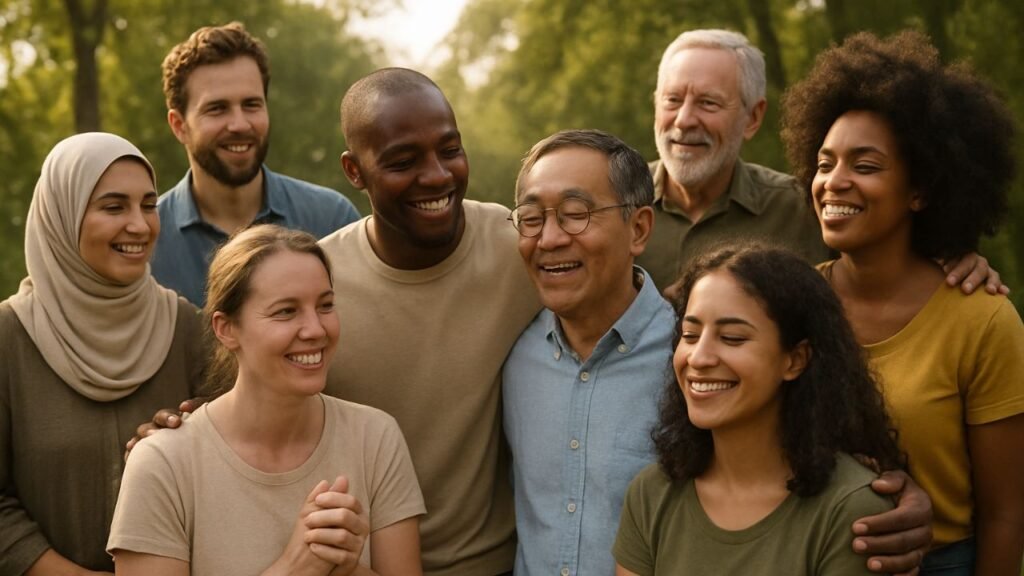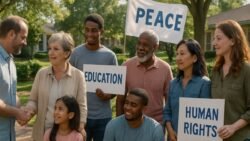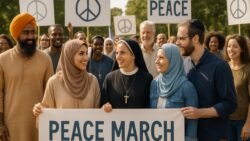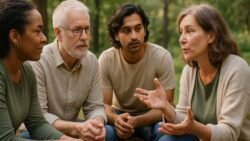Rebuilding Trust in Divided Societies – Rebuilding trust in divided societies is one of the greatest challenges facing communities that have experienced conflict, inequality, or political unrest. The United for Development and Peace (UFDP) has been working actively to bridge these divides by focusing on dialogue, collaboration, and sustainable peace initiatives. In many societies, mistrust grows from historical grievances, economic disparities, or identity-based divisions that often become deepened by violence or marginalization. Through its grassroots peacebuilding projects, UFDP provides platforms where different groups can come together, share their concerns, and build understanding. These efforts not only reduce hostility but also help create a culture of coexistence and mutual respect. Organizations like UFDP recognize that peace cannot be imposed from the outside—it must be nurtured from within communities themselves. By promoting reconciliation, education, and collective responsibility, they pave the way for more inclusive societies. The stories of hope and success from UFDP’s initiatives serve as a reminder that even in the most divided environments, unity and trust can be rebuilt with persistence and care.

Peacebuilding Through Dialogue and Community Engagement
Dialogue remains one of the most effective tools for addressing social divides and building long-lasting trust. UFDP has implemented community-centered dialogue programs that encourage open conversations between groups that may have been in conflict for years. These forums provide safe spaces where individuals can express their perspectives without fear of judgment or retaliation. Research by the United States Institute of Peace highlights that dialogue initiatives play a central role in transforming conflict into cooperation by creating empathy and shared goals. UFDP has adapted these models to local contexts, ensuring that discussions are inclusive of women, youth, and marginalized voices. Community engagement goes beyond just dialogue—it also involves joint projects such as rebuilding schools, establishing vocational training, and creating peace committees. These collaborative activities help people see each other as partners rather than rivals. As mutual trust grows, communities become more resilient and capable of addressing challenges together, reducing the likelihood of future conflict.
Education and Youth Empowerment in Peace Projects
Education plays a pivotal role in breaking cycles of mistrust and violence. UFDP places a strong emphasis on equipping young people with the tools to become peace ambassadors within their communities. Youth are often disproportionately affected by conflict, yet they also represent the most powerful agents of change. According to UNESCO, peace education fosters tolerance, critical thinking, and non-violent conflict resolution. UFDP integrates these principles into its projects by organizing leadership workshops, training sessions, and intercultural exchange programs that empower young people to advocate for peace. When youth are engaged in constructive activities and given opportunities to voice their concerns, they help reduce community tensions and inspire hope for the future. By investing in education and skills development, UFDP not only strengthens trust between communities but also addresses root causes of division such as unemployment and lack of opportunity. This long-term investment ensures that future generations grow up in an environment where peace and collaboration are valued.
 Empowering Communities Through Peace, Education, and Human Rights – The Vision and Mission of UFDP
Empowering Communities Through Peace, Education, and Human Rights – The Vision and Mission of UFDP
Success Stories of UFDP’s Peace Initiatives
The impact of UFDP’s work is best illustrated through its success stories, which demonstrate how divided societies can find common ground. In regions where mistrust once ran deep, community members have come together to jointly develop agricultural projects that promote food security and economic growth. Such initiatives reduce competition over scarce resources, which is often a trigger for conflict. A report from Peace Insight emphasizes that community-driven development creates bonds of trust by fostering interdependence. UFDP has facilitated similar projects, where former adversaries collaborate on initiatives like water supply management, local business development, and cultural events. These stories not only showcase resilience but also serve as practical models that can be replicated in other divided societies. Through its participatory approach, UFDP ensures that peacebuilding is not limited to dialogue alone but extends into tangible improvements in people’s lives. The trust that emerges from working side by side lays the foundation for lasting reconciliation and harmony.
Challenges and the Road Ahead
While UFDP’s efforts have achieved significant progress, rebuilding trust in divided societies is a continuous journey that faces numerous challenges. Deep-seated prejudices, political instability, and limited resources often slow down the process of reconciliation. Reports from the Carter Center highlight that peacebuilding requires sustained commitment and adaptability to changing contexts. UFDP addresses these obstacles by maintaining transparency in its projects and involving local leaders in decision-making processes. Another challenge lies in ensuring that peace efforts are inclusive, as leaving out certain groups can reinforce divisions. UFDP actively promotes gender equality and youth representation to make sure every voice matters. Looking ahead, scaling up these initiatives to reach more communities remains a priority. By building networks with international peace organizations and local stakeholders, UFDP aims to expand its impact and create broader coalitions for peace. Despite the obstacles, the success stories already achieved show that divided societies can heal, provided there is patience, persistence, and a shared commitment to unity.



